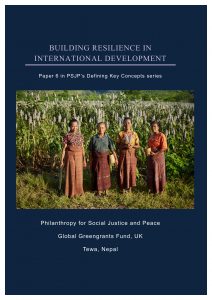 The events of 2020 (the COVID-19 pandemic, resulting economic turmoil, the ever-gathering climate catastrophe, and the global reverberations of calls against structural racism) have drawn attention to the concept of resilience. People are asking ‘how can we cope and survive?’ and ‘how can we make sure that we build back better from this crisis?’. This paper considers what resilience looks like in practice. It is based on the work of three organizations – Tewa, Global Greengrants Fund and Harvard Humanitarian Initiative. In June 2020, these organizations came together to hold two online discussions with a total of 27 participants from civil society in many parts of the world. Together these projects provide insight into the factors that promote community and disaster resilience and identify measures to mitigate those factors that impede resilience. The work was coordinated by PSJP as part of its ‘Key Concepts in Development Series’.
The events of 2020 (the COVID-19 pandemic, resulting economic turmoil, the ever-gathering climate catastrophe, and the global reverberations of calls against structural racism) have drawn attention to the concept of resilience. People are asking ‘how can we cope and survive?’ and ‘how can we make sure that we build back better from this crisis?’. This paper considers what resilience looks like in practice. It is based on the work of three organizations – Tewa, Global Greengrants Fund and Harvard Humanitarian Initiative. In June 2020, these organizations came together to hold two online discussions with a total of 27 participants from civil society in many parts of the world. Together these projects provide insight into the factors that promote community and disaster resilience and identify measures to mitigate those factors that impede resilience. The work was coordinated by PSJP as part of its ‘Key Concepts in Development Series’.
The paper has emerged as a joint effort of all concerned. It focuses on what we can learn from the work on the ground to help civil society foster greater resilience in its work and institutions in the face of current and future crises. It is being published as a discussion document as the first stage in a process to increase the understanding of practical issues in the field and will be followed up. We are aware that this is far from a complete account of resilience and that more work is needed. We hope that you will join us in this learning journey and share your stories.
The paper is in four parts:
- PART 1 gives the context of resilience in international aid. It explains the rapid rise of the term and how it has become a new paradigm in development for the field
- PART 2 explains how we conducted the current study
- PART 3 describes the experiences of Tewa, Global Greengrants Fund and the Harvard Humanitarian Initiative through the lens of resilience
- PART 4 reflects on the work so far and suggests ways forward to develop the work.
The paper is published by PSJP, Global Greengrants Fund, UK and Tewa, Nepal. It is co-authored by Urmila Shreshtha (Tewa, Nepal), Eva Rehse (GGF, UK), Vincenzo Bollettino (Harvard Humanitarian Initiative, USA), Barry Knight (CENTRIS, UK) and Chandrika Sahai (PSJP). Edited by Alan Rodney.